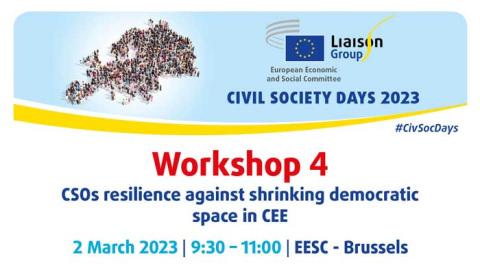European Economic
and Social Committee
Workshop 4: CSOs resilience against shrinking democratic space in CEE
2 March 2023 - 9.30 – 11.00 • Room JDE 52
- Organised by: The European Citizen Action Service (ECAS) in cooperation with the EESC ad hoc Group on Fundamental Rights and Rule of Law
- Moderated by: Simeon Stoyanov, CEE project coordinator, ECAS
Related opinions
- SOC/696, The role of Civil Society Organisations as guardians of the common good in the post-pandemic recovery and reconstruction of EU societies and economies, 18 May 2022
- SOC/639, Creation of a European statute for associations and NGOs incorporating a precise definition of an NGO or a European association (information report), 20 October 2021
- SOC/672, European democracy action plan, 9 June 2021
- SOC/671, Implementation of the Charter of Fundamental Rights, 9 June 2021
- SOC/627, Further strengthening the rule of law, 19 June 2019
- SOC/605, Resilient Democracy through a strong and diverse civil society, 20 March 2019
- SOC/563, Financing of CSOs by the EU (OIO), 19 October 2017
- EESC, Civil Society Organisations call for an EU Civil Society Strategy, 9 November 2021,https://www.eesc.europa.eu/en/news-media/news/civil-society-organisations-call-eu-civil-society-strategy
Draft Agenda
- 9.30 - 9.35: Welcome and introduction by Simeon Stoyanov, CEE project coordinator, ECAS
- 9.35 - 9.45: Keynote speech by Assya Kavrakova, Executive Director, ECAS
- 9.45 - 9.55: Engaging and understanding the audience (Slido poll) by Simeon Stoyanov, ECAS
- 9.55 - 10.00: Introducing the panellists by Simeon Stoyanov, ECAS:
- Cristian Pîrvulescu, Member of the EESC and President of the Ad hoc group on Fundamental Rights and the Rule of Law
- Filip Pazderski, Vice-President, ECF; Head of the Democracy and Civil Society Programme, Institute of Public Affairs, Poland
- Maja Stojanović, Executive Director of Citizen’s Association for Democracy and Civic Education - Civic Initiatives, Serbia
- 10.00 - 10.15: Panel discussion part 1: CSOs targeted by state or state-affiliated attacks
- 10.15 - 10.20: Audience Q&A on part 1
- 10.20 - 10.35: Panel discussion part 2: Predicting attacks against civil society?
- 10.35 - 10.40: Audience Q&A on part 2
- 10.40 - 10.55: Panel discussion part 3: Reactive and proactive solutions to attacks against civil society
- 10.55 - 11.00: Audience Q&A and conclusion
Concept note
Over recent years many CEE societies have seen a number of actions by state actors that intentionally result in a shrinking democratic space for CSOs. We are witnessing targeted disinformation attacks and discrediting actions, in addition to legal, administrative and fiscal pressuring. These threats, together with the decline of the rule of law in the region and a rising media interest, have a detrimental effect on CSOs' capacity to participate in democratic processes and act as guardians of European fundamental rights.
This workshop seeks to understand how civil society can prepare for and counteract the threats and attacks perpetrated by state, state-linked or state-owned actors. Firstly, a keynote speech and a presentation of Civic Space Watch stories will introduce the political and media environment that civil society is navigating in the region, and present the fundamental problems of the operating framework in the region. Following this, a panel discussion will bring together representatives of CSOs, public authorities, academia and the media to explore a number of key questions regarding shrinking democratic spaces for civil society. First, is there an overarching tendency across CEE countries for governments to target organisations active in particular fields, for example education or non-discrimination, and, if so, why? Second, are there early warning indicators that can alert CSOs to the emerging threat of upcoming attacks or harassment against them? Last but not least, what are the tools and approaches that can be used to counteract the attacks (for example in social or traditional media) when they occur?
Discussion points
- Part 1: Which CSOs are the targets of state attacks in CEE? Are CSOs that work in specific thematic areas at greater risk (i.e. are there specific areas that are causing greater concern or is civil society attacked indiscriminately)?
- Part 2: Are there early warning signs of an incoming attack or discrediting action that CSOs could look out for? Do these occur, for example, around elections or other predictable events?
- Part 3: How should CSOs react to attacks? What are the working approaches and actions that civil society can take in order to counteract these threats both reactively and proactively?
Work organisation
Downloads
-
WS 4 CSOs resilience against shrinking democratic space in CEE - Report
